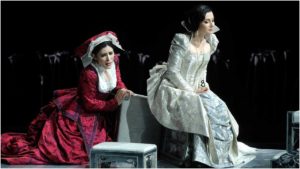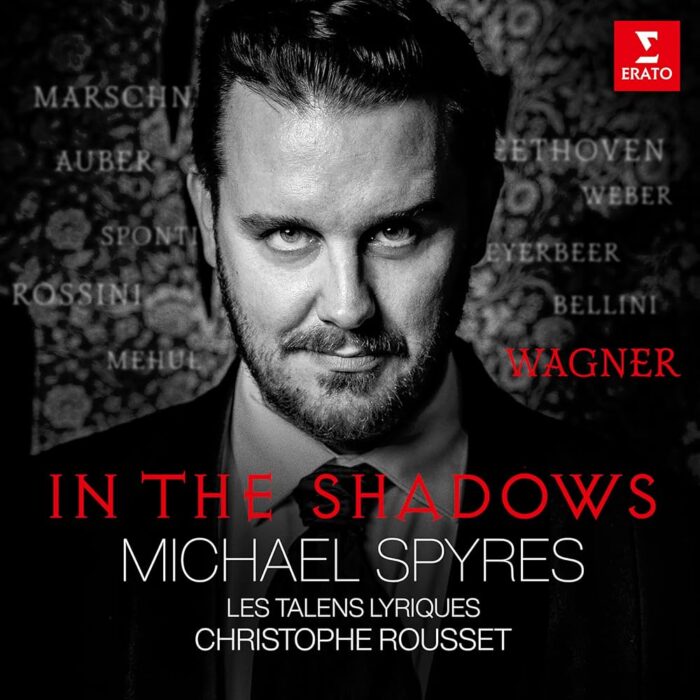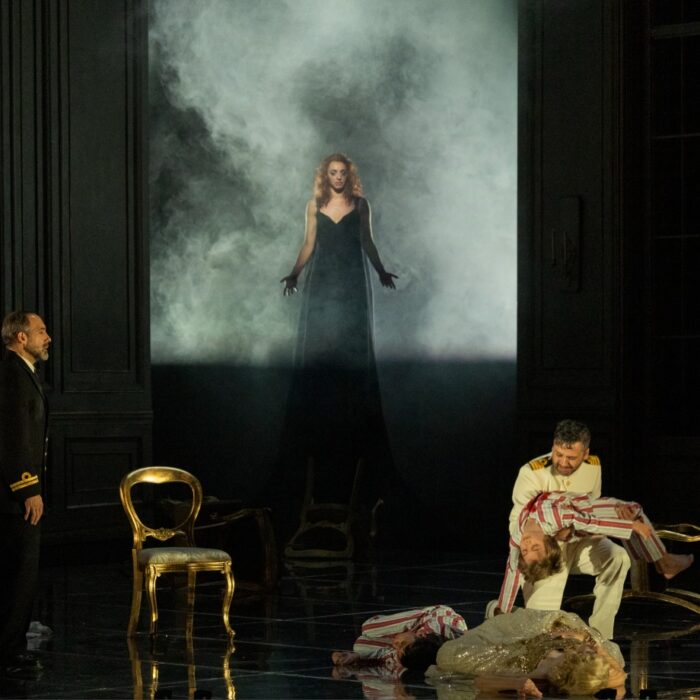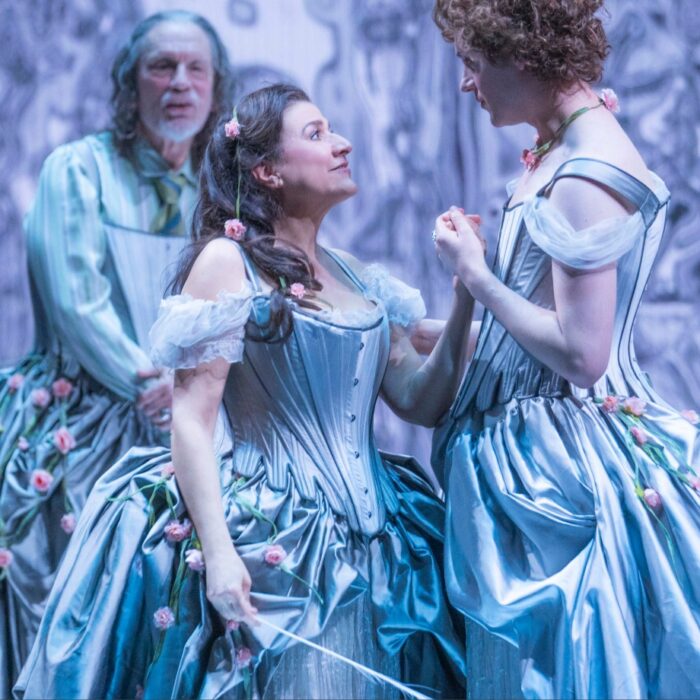
Teatro Filharmonico 2017-18 Review – Anna Bolena: Irina Lungu & Annalisa Stroppa Lead Incredible Cast In Graham Vick’s Relevant Production
By Alan NeilsonThe Tudors were a colorful bunch of monarchs, who were never afraid to chop-off the odd head here and there, indulge themselves in various kinds of political and sexual intrigues, father the occasional bastard, change the country’s religion now and again whilst burning a few heretics along the way, and seemed positively addicted to controversy. Their history is littered with (in)famous events and characters, such as the execution of Mary, Queen of Scots, the Spanish Armada, ‘Bloody Mary’, the ‘Virgin Queen’ and, of course, everyone’s favourite, Henry VIII and his six wives. It is hardly surprising, therefore, that writers and opera composers were drawn to them. Tweak the historical narrative a little and they were assured of a gripping tale that guaranteed audience interest. Donizetti, in particular, although he was certainly not alone, seemed to be enamored with this dysfunctional family and their larger-than-life behaviour. During his lifetime he wrote four Tudor based operas “Robert Devereaux,” “Maria Stuarda,” “Elisabetta al Castello di Kenilworth” and “Anna Bolena,” and it is this last opera, originally produced in 2007, by Graham Vick, which the Teatro Filharmonico are reprising during May.
Pulling No Punches
This was an unremittingly dark production, which did not pull its punches. During the overture Enrico’s six wives walked across the stage, one following the other, in various states of emotional distress – one is wracked with fear, one in a state of madness, another simply numb, and so on – but all have been psychologically damaged by their husband, victims of his tyrannical abuse. Over the next two acts we watch as Anna Bolena, his second wife, is also psychologically ground down and eventually destroyed, ending in her going mad, as she forced to confront her own death, a fate engineered by Enrico’s manipulations. Moreover, her replacement Giovanna Seymour, is also shown descending down the same dark hole, another victim on her way to emotional collapse.
With the aid of Paul Brown, who designed the scenery and costumes, and the lighting engineer, Giuseppe di Iorio, Vick presented a largely traditional reading of the work, set squarely in the 16th century, with the occasional symbolic conceit to underline a particular point, such as the large sword and blindfolded head, set centre stage as Anna receives her death sentence during the second act, emphasing the mockery that masquerades as justice in Enrico’s England. A bed is given pride of place for large parts of the staging to draw attention to Enrico’s sexual abuse. The sets were dominated by dark scenery, with soft lighting to magnify the gloom that hangs heavily over the court. However, the costumes were in bold colors, and created a welcome contrast. Although appearing to be traditional costumes, there were numerous odd anomalies that appeared to serve no purpose, other than to please aesthetically; particularly strange was Enrico’s costume covered in eyes, and to a lesser extent Giovanna’s final costume which had giant puffed out arms. It is nevertheless fair to say that, throughout the performance, Vick and his team produced a compelling reading of the work, and that it was enriched by an intelligent and inventive staging. Of particular note was Enrico’s confrontation with Anna in the first act; he seated on a rearing golden stallion, she on a sedate silver mare. Not only was this visually stunning, but the multi-layered symbolism had been cleverly wrought.
Reigning Supreme
The role of Anna Bolena is a formidable one requiring an excellent vocal technique, well-honed acting skills, a strong stage presence, along with large reserves of physical and emotional energy. For sopranos who are able to shine in the role the effect on their reputation can be considerable. Not surprisingly, therefore, it has attracted the attention of some of opera’s finest, including Callas, Sutherland and, more recently, Netrebko. For this production the role was parted by the soprano, Irina Lungu, and she created a dazzling portrayal of the ill-fated queen. Throughout most of the evening Lungu portrayed Anna as a self-possessed, dignified queen who withstood her tribulations with great courage. In the final scene, however, facing her execution she completely dissolves and descends into madness; the sharp contrast marvellously heightening the effect. Lungu possesses an agile soprano with a strikingly beautiful tone, which she employed with intelligence and virtuosity. Yet, it was the emotional depth and the degree to which she identified with the role that really impressed, so much so that the mad scene was exhausting to watch. Every phrase was riven with her delusions, her confusion and fears. By the end, it was possible to read the emotional tension etched into Lungu’s face. She had really given her all, and had produced a captivating performance of real quality.
No Less Compelling
The role of Anna’s rival, Giovanna Seymour, was played by Annalisa Stroppa, and it is fair to say that she made no less an impression than Lungu. Caught between her deep affection for Anna and Enrico’s aggressive advances she cut an almost equally tragic figure herself. In the first act, her desperate attempts to resist Enrico were uncomfortable to watch. Although stopping short of force, he exerted intense pressure on her to succumb to his advances. There was no romance or love involved. So much so that the scene became a pertinent illustration of how the powerful are able to sexually abuse the less powerful. On the other hand, her relationship with Anna was one of tenderness and sympathy, at least on her part. Anna’s attitude, however, was understandably more ambiguous. Although it was announced, prior to curtain up, that Stroppa was unwell, there was no evidence of this, so accomplished was her singing. From the opening phrase of her first aria, “Ella di me, sollecita,” her voice enchanted with an expressivity that immediately captured the attention. Throughout the evening she sang with energy, subtlety and brio. Whether singing pianissimo or fortissimo her voice remained steadfastly secure, with a wonderfully fresh and clear timbre. She possesses a seamless passaggio and her voice truly blossoms in its upper register. The aria “Per questa fiamma indomita” allowed Stroppa to show off her intelligent phrasing, delightful embellishments and attractive coloratura, as she pleaded with Enrico to spare Anna’s life. It was a scintillating performance in a substantial role.
Unbridled Passion
The tenor Antonino Siragusa, parted in the role of Lord Percy, made a very strong impression on the audience, who gave him a long ovation at the curtain call, and it was throughly deserved, too. In love with the Queen, and unknowingly being used by Enrico as bait in a trap to replace her with Giovanna Seymour, Percy pours out his feelings about Anna in the aria “Ah! Cosi nei di ridenti.” Siragusa, the embodiment of the ardent lover, sang with conviction and passion. His sweet sounding italianate voice soared marvellously, losing none of its shape or strength in the process, each phrase being well-crafted and beautifully embellished. Yet, notwithstanding his undoubted talent, he seemed unwilling or unable to reign in the vocal power, preferring to sing fortissimo almost as a matter of default, which, of course, is not necessarily a problem when singing a solo aria, but in the ensemble pieces it created an unbalanced sound as his voice dominated to the detriment of the overall effect. On the occasions when he did remember to turn down the volume he exhibited wonderful control and a beautiful sound.
Strutting His Stuff
In the role of the King was the baritone Mirco Palazzi. Arrogant and self-centered, unafraid to use and abuse his power Palazzi, as Enrico, strutted around the stage, chest out, hands on hips and delivered a vocally and physically convincing portrayal of the monarch-cum-sociopath, concerned about absolutely no one other than himself. Palazzi sang with great subtlety, his every phrase packed with detailed infections and nuanced shadings, and produced a strongly drawn Enrico. His lengthy confrontations, for example, with Stroppa in the act one seduction scene, were always sung with an intense honesty which helped create powerfully dramatic scenes. Unlike Siragusa, however, Palazzi was sometimes underpowered, most notably in the Act two trio in which he was overshadowed by Lungu and Siragusa.
Stepping in as a last minute replacement, Manuela Custer produced a fine display in the role of Smeton. She has a finely honed technique, which she used to draw a wonderfully nuanced picture of the lovesick page, her voice awash with an array of colourful shadings.
Lord Rochefort, Anna’s brother, was sung by the bass Romano Dal Zovo. Although a relatively minor role, he made a strong impression. His vibrant bass is cultured and melodious, which he used effectively to generate a persuasive and expressive performance. Nicola Pamio playing the part of Sir Harvey, a court official, put in a reasonable performance, but on occasions his voice exhibited a little too much vibrato.
The Coro dell’Arena di Verona was costumed and choreographed with imagination and managed successfully. Generally, the male and female members were split into two groups and sang on different parts of the stage. In line with production’s overall coloring the women were dressed in black traditional 16th century costumes, while the men were dressed in black costumes from a more recent period. As was the case with the soloists’ costumes this was a strange mix, but aesthetically pleasing. Their movements were choreographed to suggest formal courtly manners, and coordinated so that they all bowed or moved in perfect unison, which created a pleasant impression. Musically, under the management of the chorus master, Vito Lombardi their performance veered between excellent and acceptable. At times their voices were a shade too quiet, making it difficult to catch the words, whilst at other times their singing really added to the onstage tension by perfectly capturing the mood of the drama.
The Orchestra dell’Arena di Verona under the baton of Jordi Bernàcer took up a subservient position, and allowed the singers to dominate. Bernàcer ensured that the musical focus was always centered on the stage, that the singers were always given his full support and that the balance always favored the voice over the orchestra. None of which should be taken to mean that this was not an accomplished performance by the orchestra. On the contrary, Bernàcer produced a refined reading of the score, and elicited its subtle textures, albeit in a gentle and understated manner.
Overall, this was a first rate performance, and the principal soloists were simply excellent!


